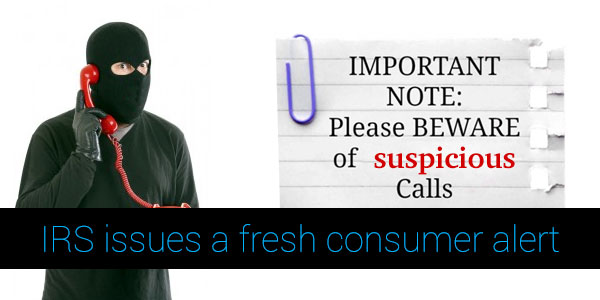Beware of any caller who says you have a refund due, and to get that you need to share your confidential details. Chances are high that this caller is not calling from the IRS. The caller is simply acting as an IRS officer to gain your trust so that you'll easily reveal your confidential details. Once the caller gets the required details, his goal will be fulfilled and then he would take necessary steps to scam you.
Tips you can use to identify suspicious calls
The IRS has issued a strict warning to consumers regarding suspicious calls. The con artists are smart people. They have a sharp mind and good convincing skills. They have already done little bit of research upon you. So, when you're talking to them, they would pretend as if they know everything. But, in reality, they're only acting so as to get your bank account numbers, credit card details, etc.
According to the IRS Commissioner John Koskinen, people are getting these types of suspicious calls across various parts of the country. Besides, they use fake names and badge numbers to gain confidence of consumers. Moreover, if consumers don't receive those calls, then they get an urgent call back request in their answering machine.
John Koskinen says people should not be deceived by suspicious calls. Many people get nervous when scammers (posing as the IRS officials) threaten on tax issues. For them, it is important to know that the IRS has “formal process in place for people with tax issues”.
The best way to avoid getting scammed is to filter those calls. Check out the 5 ways to identify those suspicious calls and stay unharmed.
- The caller says that you've to repay tax fast or you'll be arrested.
- The caller asks you to reveal your debit or credit card number.
- The caller asks you to pay tax through a specific method.
- You're asked to pay tax without giving any chance to shoot questions about the owed amount.
- You get a call regarding the unpaid tax without receiving an email.
How to deal with suspicious calls
Here are some tips you can use when someone claims to be an IRS officer and asks you to pay tax.
- Contact the Treasury Inspector General: Are you sure you don't owe tax? If yes, then report the matter to the Treasury Inspector General for Tax Administration. You can directly visit the website tigita.gov. Otherwise, you can also call at 1.1800.366.4484.
- Call the IRS immediately: So you're not sure about tax related issues. You think you don't owe any money to the IRS, but you're not absolutely sure. What will you do in this case? Give your credit card details to the caller immediately? Certainly not. Call at 1.800.829.1040 and talk about the payment related issues with IRS officials.
- Contact the FTC: If you've been a fresh target of the scammers, then contact the FTC without any hesitation. Visit their website ftc.gov. Use their FTC Complaint Assistant and report the scam. Make sure you write about the nature of the IRS Telephone Scam in your comments.
The bottom line
If you really need any information about tax or payment related issues, then visit the official website of the IRS. Their official website is irs.gov. Remember, the IRS does not discuss about your personal tax related issues through social media or text messages or emails. If you want to report fraudulent activities, then all you need to do is just type “scam” in the search box. You'll get more resources on how to report scams to the IRS.









